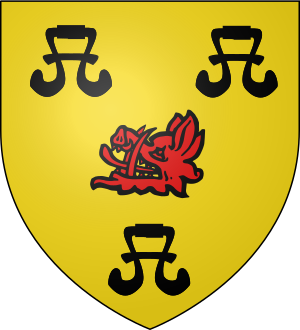Hugh Rose, 16th of Kilravock facts for kids
Quick facts for kids
Hugh Rose
|
|
|---|---|

Coat of Arms Clan Rose
|
|
| Member of Parliament for Ross-shire |
|
| In office 1708–1710 |
|
| Preceded by | New office |
| Succeeded by | Charles Rosse |
| In office 1734–1741 |
|
| Preceded by | John Munro |
| Succeeded by | Charles Ross |
| Personal details | |
| Born | 1 January 1684 Kilravock Castle, Nairnshire, Scotland |
| Died | 5 May 1755 (aged 71) Kilravock Castle, Nairnshire, Scotland |
| Spouses | Elizabeth Grant Jean Rose |
| Children | 11 |
| Parents |
|
| Education | University of Aberdeen |
Hugh Rose (1684-1755) was an important Scottish leader. He was the 16th Baron of Kilravock, which means he was the head of his family's estates. He also served as a Member of Parliament for Ross-shire. As the Chief of Clan Rose, he led his family and their people.
Hugh Rose took over his father's estates and became Clan Chief in 1732 when his father passed away.
Contents
Early Life and Education
Hugh Rose was born in 1684 at Kilravock Castle in Scotland. His father was Hugh Rose, the 15th Baron of Kilravock. His mother was Margaret Campbell.
The Rose family was very old and important. They had owned their lands at Kilravock Castle since around 1290. They received their noble title in 1293. Hugh's father wanted him to have a great education. So, Hugh studied in Scotland at the University of Aberdeen and also in other countries.
Political Career
Hugh's father wanted him to become a Member of Parliament. It was easy for Hugh to be elected in Nairnshire. However, his father also wanted him to run for election in Ross-shire.
Hugh's father was the Sheriff of Ross at the time. He used his position to help Hugh get elected to Parliament. Some people questioned how the election was won. However, Hugh had strong supporters. These included his brother-in-law, General Alexander Grant, and Lord Seafield. In 1710, his election for Ross-shire was declared invalid.
Supporting the Government
During the Jacobite rising of 1715, Hugh helped his father protect Kilravock Castle. They supported the government forces led by John Campbell, 2nd Duke of Argyll.
After this, Hugh did not play a big role in politics for a while. This changed when his father died in 1732. Hugh then inherited his father's lands and also became the Sheriff of Ross.
Hugh served as Sheriff until 1734. He then decided to resign so he could run for Parliament again. He was successfully elected as a Member of Parliament for Ross-shire. Hugh served as an MP until 1741, when he stepped down.
A Clever Leader
Hugh Rose was known for being very clever in politics. This was clear during the Jacobite rising of 1745. He managed to host both Charles Edward Stuart (the Jacobite leader) and the Duke of Cumberland (the government's general) on the same night. He hosted one at Kilravock Castle and the other at his house in Nairn. This showed his ability to stay neutral and protect his family's interests during a difficult time.
Family Life
Hugh Rose married twice. His first wife was Elizabeth Grant. They married on May 23, 1704. They had two sons and one daughter. Only their sons lived to be adults:
- Hugh Rose, 17th of Kilravock (1705-1772)
- Lewis Rose
Elizabeth Grant passed away in 1714. Hugh then married his cousin, Jean Rose, in 1719. They had two more sons and six daughters. One son and four daughters lived to adulthood:
- John Rose (born 1707), who became an army officer. His descendants include the Roses of Coulmony and the Roses of Montreal.
- Henrietta Rose (died 1795), who married Sir William Dunbar, 3rd Baronet.
- Anne Rose, who married Sir Harry Munro, 7th Baronet.
- George Rose, who became an army officer.
- Margaret Rose (died 1759), who married Dr. Joshua Mackenzie.
- Jean Rose, who married Duncan Ross.
Hugh Rose, 16th Baron of Kilravock, passed away in May 1755 at his home, Kilravock Castle.
 | John T. Biggers |
 | Thomas Blackshear |
 | Mark Bradford |
 | Beverly Buchanan |

